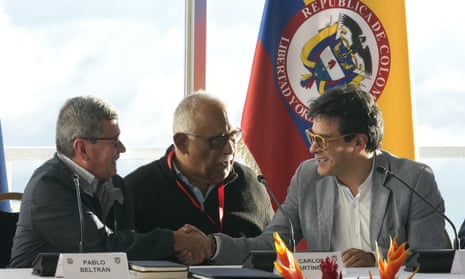Negotiators from the Colombian government and the leftist National Liberation Army (ELN) guerrilla group have begun fresh peace talks, the first major step in President Gustavo Petro’s efforts to end nearly 60 years of war.
Petro, a former member of the M-19 insurgency who took office in August, has promised to bring “total peace” to Colombia by negotiating with rebels and crime factions involved in drug trafficking and illegal mining.
“We cannot see each other as enemies, the labor we have is of reconciliation,” said the ELN negotiator Pablo Beltrán. “We hope not to fail these expectations for change.”
The talks – which began in the Venezuelan capital, Caracas – will rotate among guarantor countries Venezuela, Cuba and Norway, according to the Colombian government.
“We are committed to talks with an organization that also wants peace,” said the head government negotiator, Otty Patiño. “We are going to reach safe port … a real peace.”
The delegations had their first meeting on Monday, Colombia’s high peace commissioner, Danilo Rueda, said.
Previous attempts at negotiations with the ELN, which has about 2,400 combatants and was founded in 1964 by radical Catholic priests, did not advance partly because of dissent within its ranks.
The group is believed to have about 4,000 fighters in Colombia, and is also present in Venezuela, where it runs illegal goldmines and drug trafficking routes.
The organization became Colombia’s largest remaining guerrilla group after a 2016 peace agreement disbanded the Revolutionary Armed Forces of Colombia, known as Farc. Since the historic deal was signed, the ELN has increased its activities in territories formerly under Farc control.
Leaders have said the group is united, but it is unclear how much sway negotiators hold over active units. Much of the ELN’s negotiating team is decades older than many of its fighters.
The negotiations do not mean a suspension of military operations against the rebels, Colombia’s defence minister, Iván Velásquez, said earlier on Monday.
Talks between the ELN and the government of Juan Manuel Santos began in 2017 in Ecuador, later moving to Cuba, but were called off in 2019 by Santos’s successor, Iván Duque, because the ELN refused to halt hostilities and killed 22 police cadets in a bombing.
Petro has also promised to fully implement a 2016 peace deal with the now-demobilized Farc rebels. More than 450,000 people have been killed in Colombia’s six decades of internal conflict.
